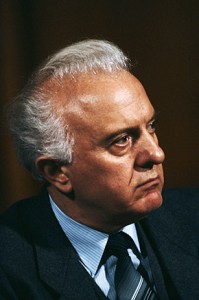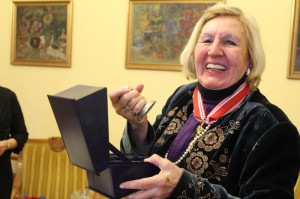RJ GAUDET & ASSOCIATES L.L.C.
"Let us realize the arc of the moral universe is long but it bends toward justice."
Dr. Martin Luther King, Jr.
Eduard Shevardnadze’s Contribution to International Human Rights
By Prof. Dr. Ingrid Detter de Frankopan
Due to the recent passing of Eduard Shevardnadze, it is fitting to remember his enormous contribution to the field of international human rights during a time in which the Soviet Union had not accepted the jurisdiction of the International Court of Justice with respect to human rights agreements. His vision led the Soviet Union to the recognition of international human rights instruments with long-term impact.
The Communist regimes with which Mr. Shevardnadze worked had one obsession that made all other principles fade away in comparison: the State decides. That meant that if the State (= the Communist Party) decided on an action, the validity and usefulness of that could not be questioned. Above all, the consequences of this exaggerated stress of the importance of State power implied that rules of international law had no effects at all inside a State.

Mr. Shevardnadze moved the Soviet Union towards accepting the jurisdiction of the International Court of Justice with respect to human rights agreements.
On the one hand, the communist doctrine predicted the ‘withering of the State’; this was an important idea of Lenin (and Marx & Engels) but this was somewhat marginalized under Stalin to whom the notion of a strong communist State was paramount.
On the other hand, the function of international law was, to the communists, merely a system of relationships between States with no internal effects at all: to even discuss Human Rights in another State was seen as illegitimate interference or illegal ‘intervention’. Numerous protests in the General Assembly of the United Nations during the time of the Soviet empire show how sensitive communist leaders were when it came to discussion of human rights inside their countries.
This was the attitude of the entire communist bloc in Eastern Europe plus China and Cuba. Even other non-communist States had adopted similar views, often under the guise of claiming to have a ‘dualist’ view of the relationship of internal law and the international legal system. For example, Sweden, under a socialist government, resisted any attempt to allow the incorporation of international standards without a formal ‘transformation’ into municipal law. Traditional textbooks in international law claimed that there were no ‘intrinsic’ rules on human rights: all would have to be incorporated into Swedish legislation to be operative. This was the case until I was nominated in 1988 to the Lindhagen (ironically Lindhagen was the Mayor of Stockholm who welcomed Lenin to Stockholm in 1917!) Chair of International Law at Stockholm University when I published my own textbook (The International Legal Order, 1st ed., 1990); the Prefect of Law Faculty suggested I should remove the three pages on ‘intrinsic’ rules as this view was ‘not compatible with Swedish law’. Rather than agreeing to this, I expanded these views into three chapters and then resigned from the professorship in 1995.
But before then, in 1989, the eminent Foreign Minister of the USSR, Eduard Shevardnaze, made an astonishing announcement: the USSR decided to ratify the UN Covenants on Human Rights. As I mention in my International Legal Order in the following lengthy excerpt is appropriate to quote at this time as an explanation of Mr. Shevardnadze’s significant impact on international human rights:
“A noteworthy statement was made by the then Soviet foreign minister Shevardnaze on 9th March 1989, in connection with the ratification, by the Soviet Union of the United Nations Covenants on Human Rights: also the Soviet Union – although it adhered to the dualist doctrine – admitted the supremacy of rules of international law on Human Rights. The document does not limit this supremacy to only basic Human Rights but states that, as a system, international law is higher than national laws. The Soviet Union notified the United Nations of the withdrawal of its earlier reservations concerning the compulsory jurisdiction of the International Court of Justice in respect of agreements relating to Human Rights. The Representative of the USSR asked, in an accompanying note, that the letter of Mr Shevardnaze be distributed as a document of the General Assembly and Mr Shevardnaze himself, who obviously attached considerable importance to the statement, asked the Secretary General, as depository of the relevant Human Rights treaties, to distribute his letter `as an official document of the United Nations’. He wrote
`The Soviet Union, which attaches great importance in present circumstances to enhancing the role of the International Court of Justice in world affairs, has begun to consider the question of withdrawing the reservations which it made previously to a number of international treaties concerning the jurisdiction of that judicial organ. Given the importance of the further promotion of co-operation among States in the humanitarian sphere, it was deemed desirable to begin the process by dealing with Human Rights agreements.’
In the light of the above, on 10th February 1989, the Presidium of the Supreme Soviet of the USSR adopted a decree whereby the Soviet Union accepts the compulsory jurisdiction of the International Court of Justice in respect of the following international treaties: the 1948 Convention on the Prevention and Punishment of the Crime of Genocide, the 1949 Convention for the Suppression of the Traffic in Persons and of the Exploitation of the Prostitution of Others, the 1952 Convention on the Political Rights of Women, the 1965 International Convention on the Elimination of All Forms of Racial Discrimination, the 1979 Convention on the Elimination of All Forms of Discrimination against Women, and the 1984 Convention against Torture and Other Cruel, Inhuman or Degrading Treatment or Punishment.
The Soviet Foreign Minister Mr Shevardnaze then went on to underline the reasons for this change in Soviet acceptance of the compulsory jurisdiction of the International Court of Justice and commented on the revised attitude of the Soviet Union to international law in general. He said
`In taking this decision, the Soviet Union was guided by the desire to strengthen the international legal order, which upholds the primacy of law in political affairs. In advocating the primacy of international law, we take the position that international legal norms and obligations of States take precedence over their domestic enactments.’[1] (Emphasis added.)
This is a forceful statement which underlines the primacy of international law. The Soviet Union was one of the communist States which had earlier claimed that sovereignty implies full freedom of the State to act. But this indicates that, even if a State with such views on sovereignty, there are certain important basic rights in international law which must not be set aside in internal legislation.’ (International Legal Order, 2nd ed., London, (Dartmouth), 1994, pp 172-174)
The legacy of Mr Edward Shevardnaze will go down to history as a brave man who, eight months before the fall of communism, defied one of the most fundamental precepts of communism, the one about the primacy of national laws above intrinsic and fundamental rules on human rights in international law!

Prof. Dr. Detter de Frankopan receiving the Great Seal of Poznan in Poland, March 2013, for her international legal work, charity, and contributions to the Catholic Church.
About the author: Prof. Dr. Ingrid Detter de Frankopan is a Barrister in the United Kingdom who has represented a sovereign nation before the International Court of Justice and formerly served as legal advisor to the Holy See. Her latest book, The Law of War (3d ed.), was the subject of a book launch in June 2014 at Oxford University. She represents private parties in international commercial arbitration and other disputes.
[1] General Assembly document A/44/171, 9th March 1989.


